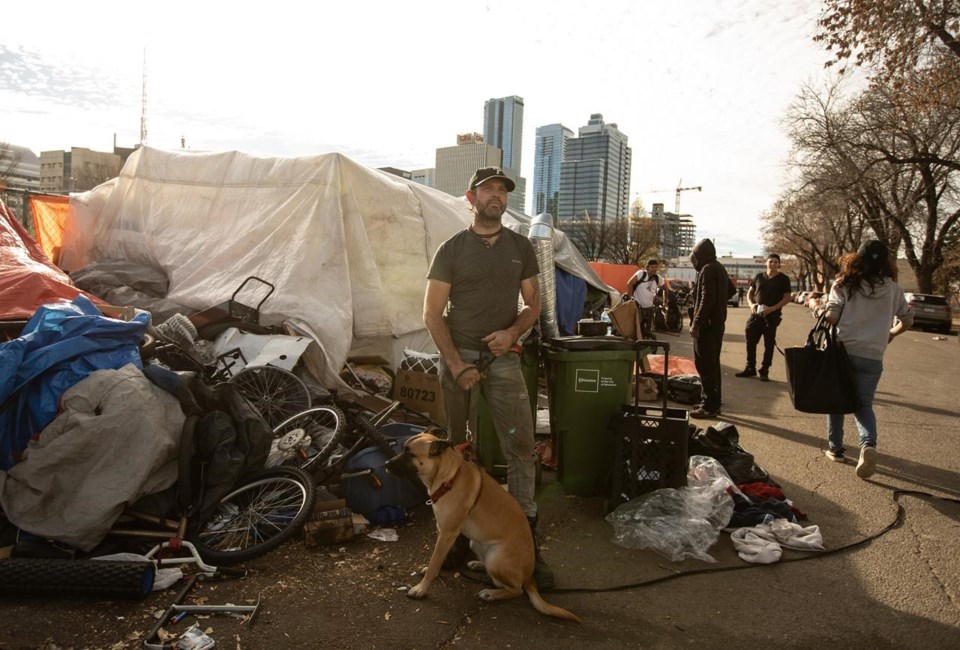EDMONTON — A judge has extended an emergency pause on a police plan to remove a long list of homeless encampments in Edmonton after police, the city and a human rights group reached an agreement that will see eight camps that are considered a public safety risk taken down.
Before proceeding with removing the eight camps, the city and police must issue notice again to the people living in them, as well as make sure there are alternative accommodations available for the residents.
The pause will last until Jan. 11, when court will hear an earlier injunction application from the Coalition for Justice and Human Rights, which has launched a lawsuit against the city over its policy of removing homeless camps.
The coalition successfully argued Friday for the emergency pause after police told social agencies they planned to remove a large number of camps this week.
But that pause only lasted until Monday to allow the court to hear additional arguments from police about why the removals were necessary.
There's no specific date for the removal of the eight camps that have been deemed a public safety issue.
“We believe that work needs to be done immediately to address the highest-risk encampments, for example, one by one based on risk," Michael Gunther, a lawyer representing the city, told Monday's hearing.
Court of King's Bench Justice Kent Davidson, who heard Monday's evidence, had urged all of the groups to reach a compromise.
Jeffrey Westman, a lawyer for the Edmonton Police Service, told the hearing that police are prepared to check for available shelter spaces prior to closing a camp, and are also prepared to consider the outdoor temperature, unless the camp is deemed a risk to public health and safety.
Westman argued the camps that were to be targeted this week were ones police deemed serious, and he described to the hearing a recent encampment fire in the city that burned a nearby vehicle and adjacent residence.
"If police had not been there and seen the fire, it would almost certainly have consumed the nearby house," he said.
Westman described camp residents being burned alive, with tent materials melted to their skin. He also noted three sexual assault cases in a short period of time connected to "one or two" locations downtown.
A 54-year-old man and a woman believed to be in her 20s died in encampment fires during the first weekend of November.
Shelters, Westman said, have space and continue to have space, although the Coalition for Justice and Human Rights has disputed that.
The coalition, meanwhile, argued that no camps should be removed if temperatures drop below -20 C, and didn't want any camps closed before Christmas unless there's an imminent threat to public safety.
Chris Wiebe, one of the lawyers representing the coalition, had earlier argued the scale and short time frame of the city's plan to close encampments this week was unprecedented and he expressed concern that police asked social agencies to stay away during the removals.
Mayor Amarjeet Sohi said in a statement Friday night that the "scale and timing" of the planned encampment response on Monday was "concerning," noting he found out about it Thursday night.
Sohi said he had immediate concerns about how vulnerable people would be supported, and said he has been advised the city isn't leading the response but has only been asked to provide cleaning services.
City of Edmonton spokeswoman Cheryl Voordenhout said in an email Sunday that the social agencies were notified of the removals to "engage their assistance, not prevent them from supporting people who need help."
"Service providers were asked to remain out of the immediate worksite for their safety. Police are involved with these encampments because they have been assessed and deemed to be high-risk encampments," Voordenhout said.
Edmonton police spokesman Scott Pattison said last month that more than 14,000 complaints against encampments had been made to the city in 2023. As a result, 4,500 camps were investigated and responded to.
— with files from Rob Drinkwater
This report by The Canadian Press was first published Dec. 18, 2023.
Jamin Mike, The Canadian Press




